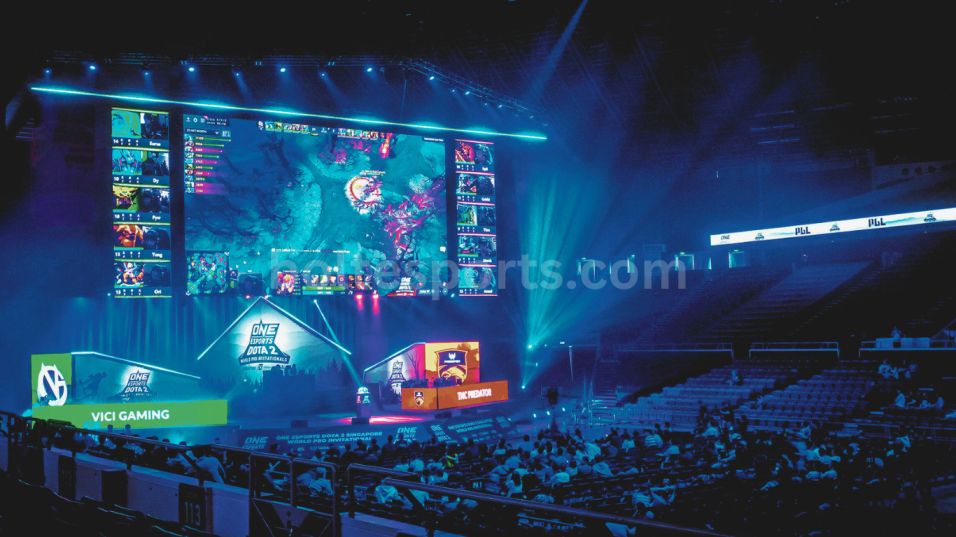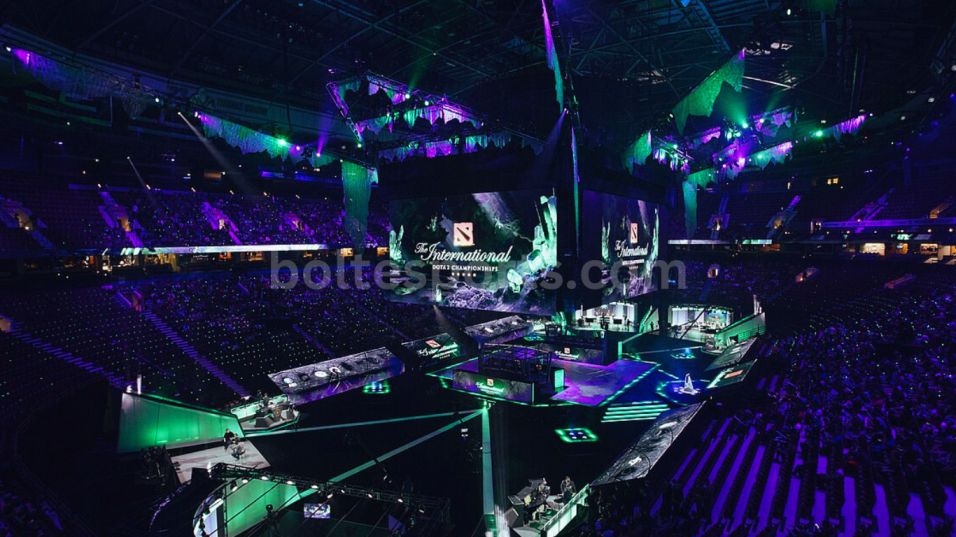An Esports caster is a person who gives live commentary and analysis for esports events. They are often referred to as shout casters or commentators. They improve the viewing experience by providing detailed play-by-play accounts, professional analysis, and insights into the games and tactics used by professional players.
Esports casters are frequently quite knowledgeable about the particular game they are casting and the surrounding competitive scene. They thrill viewers, engage the audience, and make it easier for them to follow the action on television. They must be able to think quickly and clearly, have strong communication abilities, and have a thorough understanding of the game mechanics.
Esports caster collaborate in groups, with some managing play-by-play and others handling analysis. They broadcast matches to internet viewers or a live audience while working in studios or at event locations. With dedicated casters that specialize in particular games, esports casting has emerged as a respected profession with a devoted fan base.
Table of Contents
How to Become an Esports Caster

Those who are enthusiastic about competitive gaming may find a rewarding job as an esports caster, commonly referred to as a shoutcaster or commentator. You can follow the steps listed below to become an esports announcer:
Develop a Deep Knowledge of Esports: Enter the world of esports headfirst to begin. Keep up with various competitions, games, and top athletes. Understand the gameplay mechanics, tactics, and esports industry as a whole in great detail. When analyzing games, this knowledge will be essential.
Choose a Game: Choose a game—or a few games—that you are particularly interested in and are knowledgeable about. Concentrate on getting good at certain games, and stay up to date on any new information or changes that may have occurred in the esports community for that specific game.
Practice Casting: Casting techniques should first be practiced. Casting games on your own while watching reruns or live games is a good place to start. To assess your performance, record your comments and play it again. Keep track of your weak points, such as your pacing, your lucidity, and your understanding of the game. In order to get experience, you may also think about casting in regional or smaller competitions.
Networking and Building a Portfolio: Participate in regional gaming contests, conferences, and esports events. Connect with organizers, participants, and other business leaders. At these occasions, look for chances to cast matches, even if they are unpaid or low-key. You’ll develop your portfolio and earn experience by doing this.
Create a Demo Reel: Make a demo reel that features your best work as your expertise and casting abilities grow. Make a video out of a couple of the matches that you feel are the most thrilling and well-commented. When you submit a casting application, your reel will act as your resume.
Engage with the Community: Begin developing your esports caster internet brand. Make esports casting-specific social media accounts and interact with the community. Share your ideas, observations, and standout casting moments. Engage in conversation with other commentators, players, and fans to build relationships and broaden your reach.
Seek Casting Opportunities: Watch for casting possibilities with esports leagues, competition planners, or media outlets. They frequently advertise casting positions on their websites or social media networks. Don’t give up if you get a first round of rejection after applying for these jobs. Don’t stop honing your abilities; keep at it.
Continuous Improvement: Improve your casting skills on a continuing basis. Ask for input from other broadcasters, viewers, and specialists in the field. Attend workshops or seminars to pick up knowledge from seasoned casters and subject matter experts. Keep abreast of the most recent trends and advancements in the esports sector.
Stay Professional and Persistent: Do not forget that it takes time and commitment to become a professional esports caster. Keep a good outlook, conduct yourself professionally, and pursue possibilities relentlessly. Do not stop honing your art, expanding your network, or exhibiting your abilities.
Keep in mind that entry into the casting field may be difficult at first because to the intense competition in the esports business. You can, however, improve your chances of becoming an esports caster by having a strong work ethic, persistence, and passion for the sport.
Types of Esports Caster

Esports casters come in a variety of forms, each with unique responsibilities and specialties. Some popular esports broadcaster types are listed below:
Play-by-Play Caster: Actual-time commentary on the game’s action is provided by play-by-play announcers. They concentrate on depicting gameplay, actions, and developments as they take place, giving spectators a sense of the match’s excitement and adrenaline. Play-by-play announcers must have a talent for capturing and expressing the intensity of the game, as well as outstanding communication and quick-thinking abilities.
Color Caster/Analyst: During esports contests, color commentators or analysts offer in-depth analysis, tactical insights, and professional commentary. They dissect the players’ or teams’ strategy, gameplay, and judgment. Color commentators frequently have an in-depth knowledge of the meta, strategies, and game mechanics, which enables them to offer viewers insightful commentary. They emphasize deriving the reasons for the acts and give context and depth to the play-by-play commentary.
Desk Host/Anchor: Esports tournaments and broadcasts are hosted and moderated by desk hosts or anchors. They present the matches, conduct player, analyst, and other guest interviews, and direct the broadcast’s progression. Desk hosts serve as the broadcast’s face, interacting with viewers and facilitating dialogue. They frequently possess great communication and presentation abilities.
Sideline Reporter: During breaks or in between games, sideline reporters provide extra details, interviews, and updates. Insights from players, coaches, or teams are gathered, and viewers are given real-time analysis or news. Sideline reporters must be nimble on their feet, have positive people skills, be skilled at acquiring information, and be able to communicate it to the audience clearly.
Expert/Technical Caster: Expert or technical casters focus on particular game mechanics, itemization, map control, or sophisticated strategies. They give spectators in-depth explanations and insights into these technical components, assisting them in comprehending the nuances of the game. Casters that are experts frequently have a wealth of knowledge and experience in the particular game they specialize in.
Translator: Translators are essential when interacting with players or teams from other countries or in international esports competitions. They help the audience understand each other by interpreting interviews, conversations, and analyses. Translators must be proficient in several languages, possess strong language abilities, and be familiar with gaming jargon.
It’s vital to remember that some casters may have a variety of responsibilities or skills. Depending on the esports event, organization, or broadcast production, the particular roles and titles may change. Casters frequently collaborate in teams or pairs to give viewers a thorough and interesting viewing experience.
How to be a Good Esports Caster

There are a few important traits and abilities you should cultivate if you want to become a competent esports caster. Here are some pointers for succeeding in the position:
Deep Game Knowledge: Learn everything there is to know about the game you’ll be casting. Learn about its mechanics, tactics, and meta. Keep abreast of patches, balancing adjustments, and new upgrades. The more information you possess, the more intelligent remark and analyses you can offer.
Strong Communication Skills: Develop strong verbal communication abilities. Practice speaking properly, using effective thought articulation, and keeping a steady tempo. To capture the audience, be enthused, passionate, and engaging in your delivery.
Play-By-Play and Analysis: Be able to play-by-play and analyze games with ease. To keep viewers interested during critical situations, practice offering brisk, energizing play-by-play commentary. Develop the ability to analyze and explain games, strategy, and decision-making as well to provide insightful commentary and help spectators better comprehend the game.
Adaptable and Versatile: Be flexible enough to accommodate various game genres, formats, and casting techniques. A vast variety of games, each with its own distinctive features, are included in esports. Your chances of getting cast will increase if you can adapt to different games and playstyles.
Quick Thinking and Reaction Time: Esports contests frequently feature fast-paced action and unexpected twists and turns. Develop your ability to think fast and respond to gameplay in real-time. Be ready to offer immediate analysis, highlight important moments, and modify your remark as needed.
Build a Unique Personality: As a caster, cultivate your own sense of style and personality. Strive to strike a balance between professionalism and sporting zeal. Be genuine and let your enthusiasm for esports to come over in your casting. By developing a distinctive personality, you may engage the audience and provide an unforgettable performance.
Practice and Experience: By commentating on live games, making videos of yourself casting replays, or taking part in neighborhood events, you can routinely practice casting. Even if they are low-key or unpaid, look for opportunities to gain experience and visibility. You will improve as a caster as you put more effort into practicing and getting real-world experience.
Learn from Feedback: Find out what your audience, other broadcasters, and business experts think. Constructive criticism should be actively heard in order to be improved. You can consistently hone your talents by identifying your areas for improvement via feedback.
Networking and Collaboration: Increase your esports community contacts. Join a network of casters, players, hosts, and businesspeople in your field. To increase your audience and gain insight from professionals in the subject, team up with others on podcasts or casting projects.
Stay Informed and Engage with the Community: Follow the most recent esports news, trends, and advancements. Use forums, social media, and streaming services to interact with the neighborhood. Build relationships and learn about the interests and preferences of the community by interacting with viewers, fans, and other casters.
To become a proficient esports announcer, keep in mind that it takes time, effort, and practice. As the esports market develops, be willing to learn and grow as a player while also maintaining your passion for the sport.
Conclusion
Knowledge of the games, effective communication abilities, adaptability, and practice are necessary to become a great esports caster. Develop knowledge of particular games, and deliver engrossing play-by-play commentary and incisive analysis. Develop a distinctive personality, connect with others in the esports scene, and ask for feedback to make improvements. Continue to learn, get involved, and keep developing your skills. Your chances of becoming a successful esports caster can be raised with commitment and ongoing education.
What is the job of an Esports caster?
Esports casters provide live commentary and analysis of matches. They engage viewers, describe gameplay actions, offer insights, and enhance the viewing experience. Their role is vital in bringing excitement and strategic analysis to esports events.
Who is the best esports caster?
The title of the “best” esports caster is subjective, as it varies based on personal preferences. Notable casters like Monte Cristo, DoA, Anders, ODPixel, and Sheever have made significant contributions and garnered dedicated followings in the esports community.
Related post:
Is Esports Dying? Future of Esports
1 thought on “How to Become an Esports Caster”